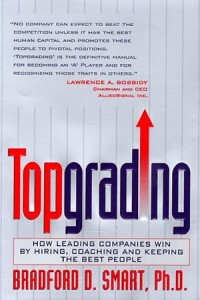What’s the One Best Question to Ask a Job Candidate?
What were your high school dreams? If you want to do well in job interviewing, get Smart.
 No, not the secret agent. Get Brad. Brad Smart, Ph.D.
No, not the secret agent. Get Brad. Brad Smart, Ph.D.
A friend from an Ivy League university group eMailed asking about interview questions a while back.
She wanted to be prepared. She knew better than to waste time asking job seekers stupid questions, So tell me about yourself…
There’s a better way. Unless you really, really trust your HR department.
The best question, as Brad suggests is,
What were your career plans in high school?
For the interviewer, the easiest way to gauge compatibility is to determine the ‘happiness’ of the job candidate. If he’s not happy were he is, he won’t be happy were he’s going.
I recommend these candidate contentment questions; a legal line of questioning:
Tell me about your high school days.
What did you want to be then?
What was your dream?
Yes. High School. All of life is high school. [sigh]
The rationale is that the closer the current position of the candidate to his High School dream, the more content the candidate is. You should only hire contentment. With fire-in-the-belly.
For example, take my favorite example, Your Business Blogger(R). I proclaimed in high school the desire to be a ‘merchant.’ A salesman. A peddler and presenter. Of intangible Big Ideas.
Today, for me: Nirvana. A consultant with a blog.
A review. Here’s a quick three point landing for evaluating a job candidate:
1) Symmetry and chemistry
2) High school dreams
3) Track record
1) Don’t fill the slot with a slut. In the job search, as in a search for the mother of your future children, symmetry and chemistry is fertile ground. And like getting married, this is the first hurtle in seeking and/or filling a position. It is a courtship dance of both parties on both sides of the interviewing table.
This was the one thing Jack Welsh didn’t bother to quantify. (Except, maybe the slut part.) (Not that there’s anything wrong with that.) Although he could certainly justify his decisions. But the big decisions involved more than numbers. It was, well, a feeling. Welsh named his book after it: Straight from the Gut . It also can be called wisdom and judgment.
For example, anyone who retains Your Business Blogger would probably like this article: Dads, Death and Debt of Honor.
If you don’t care for the article or the writing or my world view, you won’t like me. And I won’t care for you much either. Symmetry and chemistry.
2) Too cool for school. I was Co-Captain of our high school basketball team, a lifetime achievement once dismissed by a recruiter. His client didn’t have a basketball team, he snorted.
Jerk.
He obviously did appreciate my leadership skills…so I didn’t get the girls, the NBA didn’t call, I didn’t get the job. Ask about high school. Get ready for angst.
3) A reasonable rearview mirror. The final point is the easiest. The track record. Where the best indication of future performance is past performance. The easiest to measure. And verify through reference checks.
Even with candidates competing for entry level jobs, there should be few surprises on how the new hire will turn out. Hire character and integrity first. Job competence can be trained. Goodness, even gruff personalities can be coached. But counseled only on a firm foundation of Boy Scout qualities. Beyond knowledge, skills and abilities.
And there will be a test. At every open job position to be filled.
And you thought you were done with high school.
Consider a free eMail subscription for this site.
Thank you (foot)notes:
The high school question comes from Jack Welsh’s HR consultant, Brad Smart, Ph.D.. Yep, that’s his real name.
More references and checklists at the jump.
Mediations has advice on blog skills helping student job seekers.
Mudville Gazette has Open Post.
Courtesy Inc.com. Log in required. Join up. Idid.
Write a job description describing essential job functions.
Have the job description reviewed by current employees and supervisors.
Post the job internally.
Contact a recruiting agency.
Place help wanted ads in a wide range of sources.
Post on web site.
Accept resumes. See www.careerscout.com
Accept completed job applications.
Screen resumes and job applications.
Conduct pre-interview questionnaire. See Pre-Interview Questionnaire.
Prepare interview questions. See Interview Form.
Conduct interviews.
Complete applicant appraisal form.
Complete co-employee applicant appraisal form.
Call references (employers, schools, etc.). Also call people other than listed “references.” See Pre-Hire Reference Check form.
Use an Post Employment Release of Employment Information Form where necessary.
Perform background checks (DMV, credit, criminal background, etc.). See www.infolinkscreening.com.
Perform character assessment. See www.zeroriskhr.com
Inquire about any trade secret or confidentiality agreements with former employers.
Test for job skills. See www.brainbench.com
Write the offer or rejection letter.
Give necessary post-offer, pre-hire drug or physical tests. See the White Paper: Pre-Employment Testing.
Memorialize the terms of employment and have the employee sign any contract.
Have the new employee review and sign employee handbook, trade secret and confidentiality agreement and any other applicable agreements.
Introduce the new employee to your training and orientation program.
Pay any referral or retention bonuses.

1 Response
[…] My favorite interview question is to ask candidates, “What was your high school dream?” […]